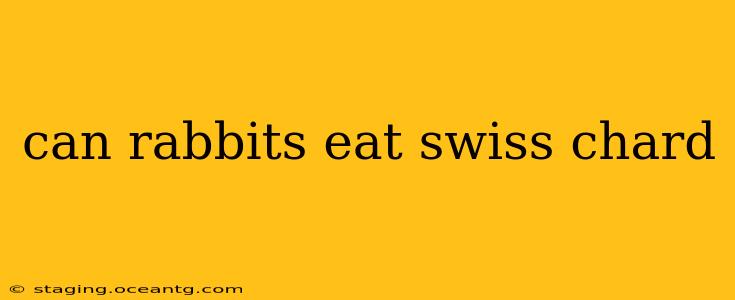Swiss chard, with its vibrant colors and nutritious profile, is a popular leafy green enjoyed by humans. But can our furry friends, rabbits, safely enjoy this vegetable? The answer is a cautious yes, but with important caveats. While Swiss chard offers some nutritional benefits for rabbits, it's crucial to understand how to incorporate it into their diet safely and responsibly.
Is Swiss Chard Safe for Rabbits?
Yes, rabbits can eat Swiss chard, but only in moderation. It's a good source of vitamins A and K, and it contains some fiber. However, Swiss chard contains oxalates, which can be harmful to rabbits if consumed in large quantities. Oxalates can bind to calcium, preventing its absorption and potentially leading to urinary tract issues like bladder stones.
How Much Swiss Chard Can a Rabbit Eat?
The key is moderation. Swiss chard should only comprise a small portion (no more than 5% to 10%) of your rabbit's overall diet. Think of it as an occasional treat rather than a staple food. A few leaves a couple of times a week is generally considered safe for a healthy adult rabbit. Always wash the chard thoroughly before offering it to your pet.
What about baby rabbits or those with health problems?
For baby rabbits or rabbits with pre-existing health conditions, especially urinary issues, it's best to avoid Swiss chard altogether or to consult with a veterinarian before introducing it into their diet. Their developing or compromised systems are more vulnerable to the effects of oxalates.
What are the benefits of feeding Swiss chard to rabbits? (In moderation)
- Vitamins: Swiss chard is a good source of vitamins A and K, essential for a rabbit's overall health and vision.
- Fiber: It provides a small amount of fiber, which aids in digestion, although hay should remain the primary source of fiber in a rabbit's diet.
What are the risks of feeding Swiss chard to rabbits?
- Oxalates: The primary concern with feeding Swiss chard to rabbits is its oxalate content. High oxalate intake can contribute to the formation of urinary stones, leading to painful and potentially life-threatening conditions.
- Diarrhea: Consuming too much Swiss chard can cause digestive upset, including diarrhea.
How to introduce Swiss chard to your rabbit's diet?
- Start slowly: Introduce Swiss chard gradually, offering only a small amount at first to observe your rabbit's reaction.
- Monitor for any adverse effects: Watch for signs of digestive upset like diarrhea or lethargy. If you notice any problems, discontinue feeding Swiss chard immediately.
- Variety is key: Ensure your rabbit's diet is diverse and balanced, with plenty of hay, fresh water, and a small amount of other safe vegetables.
Other Leafy Greens for Rabbits: Alternatives to Swiss Chard
While Swiss chard can be a part of a varied diet, consider other leafy greens that are lower in oxalates, such as:
- Romaine lettuce (in moderation): A good source of nutrients but should be given sparingly.
- Parsley: A small amount can be offered occasionally.
- Basil: A small amount of fresh basil can also be a healthy addition.
Remember, hay should make up the bulk of a rabbit's diet (80-90%), with fresh vegetables and pellets making up the remaining portion. Always consult with a veterinarian or a rabbit-savvy expert for personalized dietary advice for your pet. Their health and well-being should always be your top priority.
